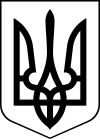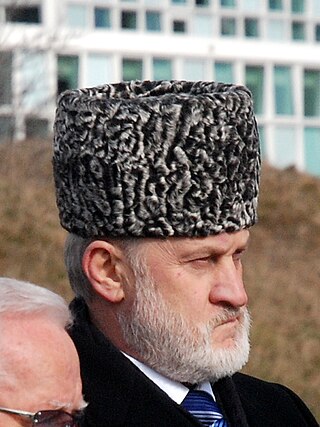
Akhmed Halidovich Zakayev is a Chechen statesman, political and military figure of the unrecognised Chechen Republic of Ichkeria (ChRI). Having previously been a Deputy Prime Minister, he now serves as Prime Minister of the ChRI government-in-exile. He was also the Foreign Minister of the Ichkerian government, appointed by Aslan Maskhadov shortly after his 1997 election, and again in 2006 by Abdul Halim Sadulayev. An active participant in the Russian-Chechen wars, Zakayev took part in the battles for Grozny and the defense of Goyskoye, along with other military operations, as well as in high-level negotiations with the Russian side.
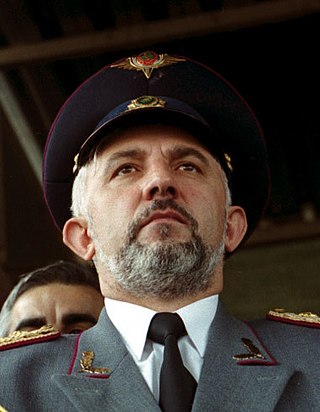
Aslan (Khalid) Aliyevich Maskhadov was a Soviet and Chechen politician and military commander who served as the third president of the unrecognized Chechen Republic of Ichkeria.
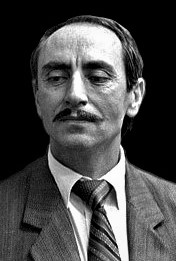
Dzhokhar Musayevich Dudayev was a Chechen politician, statesman and military leader of the 1990s Chechen independence movement from Russia. He served as the first president of the Chechen Republic of Ichkeria from 1991 until his assassination in 1996. Dudayev had previously served as a senior officer in the Soviet Air Forces.

Abdul-Halim Abusalamovich Sadulayev was the fourth President of the Chechen Republic of Ichkeria. Sadulayev served little more than a full year as President before being killed in a gun battle with FSB and pro-Russian Chechen forces.
Salman Betyrovich Raduyev was a Chechen militant and separatist field commander, from 1994 to 1999, who masterminded and was responsible for the Kizlyar hostage taking raid. His activities, in his role as a commander, made him "Russia's second most wanted man."
Sultan Geliskhanov is a former head of the state security service in the Chechen Republic of Ichkeria and a former field commander in the Chechen resistance against Russia.
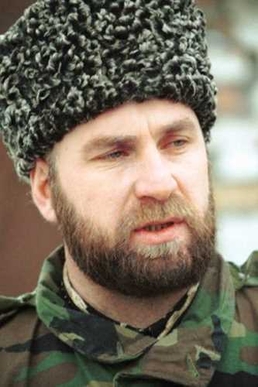
Ruslan Germanovich Gelayev was a Chechen military commander and prominent military figure of the Chechen resistance against Russia. Albeit a controversial figure, Gelayev was commonly viewed as an abrek and a well-respected, ruthless fighter. His operations spread well beyond the borders of Chechnya and even outside Russia and into Georgia. He was killed while leading a raid into the Russian Republic of Dagestan in 2004.

The Chechen Republic of Ichkeria, known simply as Ichkeria, and also known as Chechnya, is a former de facto state that controlled most of the former Checheno-Ingush ASSR from 1991 to 2000 and has been a government-in-exile since.
Movladi Saidarbievich Udugov is the former First Deputy Prime Minister of the Chechen Republic of Ichkeria (ChRI). As a Chechen propaganda chief, he was credited for the Chechens' victory on the information front during the First Chechen War.

The Presidential Palace in Grozny was a building in the center of the Chechen capital Grozny. The building became a symbol of resistance for the supporters of the Chechen Republic of Ichkeria during the early stages of the conflict in Chechnya. The building was damaged by repeated artillery and air strikes. The Russian army demolished it completely in 1996.

Khuseyn Vakhaevich Gakayev, also known as Emir Mansur and Emir Hussein, was a militant fighting in Chechnya. He was one of the most senior field commanders still operating in the North Caucasus prior to his death on 24 January 2013.
Isa Akhyadovich Munayev was a Chechen rebel and military commander who fought for the independence of the Chechen Republic of Ichkeria from Russia until he was forced into exile in Europe around 2004. He was killed in action while leading a Chechen volunteer unit on the Ukrainian side during the war in Donbas in 2015.

Ukrainian volunteer battalions were militias and paramilitary groups mobilized as a response to the perceived state of weakness and unwillingness of the regular Armed Forces to counter rising separatism in spring 2014. They trace their origins to the "Maidan Self-Defense" militias formed during the Euromaidan in 2013. The earliest of these volunteer units were later formalized into military, special police and paramilitary formations in a response to the Russian military intervention in Ukraine in 2014. Most of the formations were formed or placed under command of the Ministry of Internal Affairs — as "Special Tasks Patrol Police" — and Ministry of Defence — as "Territorial defence battalions". A minority of battalions were independent of state control.

The Dzhokhar Dudayev Chechen Peacekeeping Battalion is a Chechen volunteer battalion named after the first President of the Chechen Republic of Ichkeria, Dzhokhar Dudayev. The battalion is made up of Chechen volunteers, many of whom fought in the First Chechen War and Second Chechen War on the side of the Republic of Ichkeria, Ingush, Crimean Tatars and Ukrainians.

The Chechen National Army or Chechen Armed Forces are the united militarized formations of the former de facto Chechen Republic of Ichkeria.
The Chechen Republic, commonly known as Chechnya, is a federal republic of Russia that has been noted in several roles during the Russian invasion of Ukraine. Kadyrovite forces have fought alongside the Russian forces, while several Chechen armed volunteer formations are fighting on the Ukrainian side. International observers have noted a number of comparisons between the invasion and the First and Second Chechen Wars.
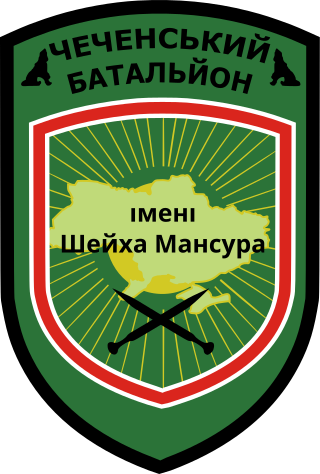
The Sheikh Mansur Chechen Peacekeeping Battalion or simply the Sheikh Mansur Battalion is one of several Chechen volunteer Armed Formations participating in the Russian-Ukrainian war on the side of the Armed Forces of Ukraine. The battalion is named in honour of Sheikh Mansur, a Chechen military commander and an Islamic leader who fought against the expansion of the Russian Empire into the Caucasus during the late 18th century.

The Separate Special Purpose Battalion of the Ministry of Defense of the Chechen Republic of Ichkeria, also known as OBON, is a spetsnaz formation of Chechen volunteers, functioning as part of the International Legion of Territorial Defense of Ukraine. It is one of several Chechen armed volunteer formations on the side of Ukraine. It was created by Akhmed Zakayev on July 29, 2022, on the basis of a Chechen formation that has been fighting on the side of the Ukrainian Armed Forces since Russia's full-scale invasion of Ukraine to combat the purposes of their common enemy.
Rustam Magomedovich Azhiev also known by the pseudonym Abdul Hakim al-Shishani is commander-in-chief of the Chechen battalion OBON fighting on the Ukrainian side in the Russo-Ukrainian war. Azhiev is a veteran of the Second Russo-Chechen war and fought on the side of the opposition in the Syrian civil war. In the latter he was the leader of the rebel group Ajnad al-Kavkaz.
The National Independence Party was a political party in the Chechen Republic of Ichkeria led by human rights activist and businessman Ruslan Kutayev. Initially opposed to the government of Dzhokhar Dudayev, the party later shifted in support of him following the beginning of the First Chechen War, and later achieved landslide victories during the 1997 Chechen presidential election.















